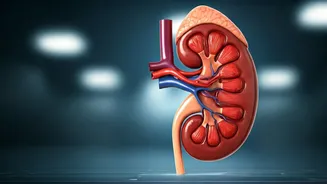Risks to Kidneys
Cardiologists have identified several everyday habits that significantly impact kidney health. One of the primary concerns is the potential for dehydration.
Insufficient water intake can strain the kidneys, reducing their ability to function effectively and filter waste. Another common issue is excessive salt consumption. High salt intake can elevate blood pressure, putting undue pressure on the kidneys and potentially leading to damage. Further, regular consumption of processed foods, often high in sodium, can exacerbate these risks. Chronic stress is another factor. The body's response to stress can lead to hormonal imbalances that affect kidney function. Understanding these habits is the first step toward better kidney health.
Dietary Adjustments
Dietary choices play a crucial role in protecting kidney health. Limiting processed foods is essential, as they frequently contain high levels of sodium, which can elevate blood pressure and strain the kidneys. Focusing on a balanced diet rich in fresh fruits, vegetables, and lean proteins is advised. It is beneficial to control the amount of sugar and fat in your diet, and consulting with a nutritionist may be helpful. Proper hydration is another key factor. Drinking adequate water supports kidney function and helps in the flushing out of waste products. Reducing intake of foods high in oxalates, such as spinach and rhubarb, can also be beneficial as they can contribute to the formation of kidney stones in susceptible individuals. Dietary changes are essential for overall kidney health.
Managing Blood Pressure
Controlling blood pressure is vital for safeguarding kidney health. High blood pressure is a leading cause of kidney damage, as it puts excessive pressure on the delicate filtering units within the kidneys, known as nephrons. Regular monitoring of blood pressure and adherence to prescribed medications are essential, particularly for those with a history of hypertension. Lifestyle modifications, such as regular exercise and a low-sodium diet, can also help to manage blood pressure. Stress reduction techniques, like meditation or yoga, can indirectly contribute to better blood pressure control. Avoiding excessive alcohol intake and maintaining a healthy weight further contribute to maintaining appropriate blood pressure levels. The proactive management of blood pressure is a significant step in the prevention of kidney disease.
Regular Exercise Benefits
Regular exercise is beneficial for overall health, including kidney function. Physical activity helps to control blood pressure and improve cardiovascular health, which indirectly benefits the kidneys. Exercise also aids in maintaining a healthy weight, reducing the risk of obesity, a known risk factor for kidney disease. Incorporating at least 30 minutes of moderate-intensity exercise most days of the week is usually sufficient. This could include activities such as brisk walking, swimming, or cycling. It is always wise to consult with a healthcare provider before beginning any new exercise regimen, especially if you have existing health conditions. Consistency is key when it comes to exercise, aiming for regular physical activity as a part of a well-rounded health strategy.
Hydration Habits
Proper hydration is crucial for kidney health, as it supports the kidneys in their essential waste-filtering functions. Drinking sufficient water helps to flush out toxins and waste products from the body, reducing the strain on the kidneys. The amount of water needed varies depending on individual factors such as activity level, climate, and overall health. Aiming for at least eight glasses of water per day is generally recommended. It is important to stay hydrated throughout the day, rather than consuming a large amount of water all at once. Avoiding excessive intake of sugary drinks and opting for water or other healthy beverages is also recommended. Monitoring the color of your urine can be a helpful indicator of hydration levels, as consistently clear urine usually suggests adequate hydration.















